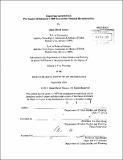Improving government : the impact of Indonesia's BRR beyond the tsunami reconstruction
Author(s)
Broid Krauze, Daniel
DownloadFull printable version (9.897Mb)
Alternative title
Impact of Indonesia's BRR beyond the tsunami reconstruction
Impact of Indonesia's Rehabilitation and Reconstruction Agency beyond the tsunami reconstruction
Other Contributors
Massachusetts Institute of Technology. Dept. of Urban Studies and Planning.
Advisor
Yu-hung Hong.
Terms of use
Metadata
Show full item recordAbstract
Sustainable disaster recovery is increasingly understood as a comprehensive process that extends beyond physical reconstruction to include efforts to improve the affected communities' ability to adapt, respond and be more resilient in the face of future emergencies. Additionally, the success of such a complex endeavor requires overseeing agencies to act with speed and efficiency but without compromising the government's safeguards and integrity. Coordinating agencies deployed after emergencies fulfill the efficiency requirement but falter on the other two, while reconstruction through permanent government sometimes lacks speed. I postulate that Implementing Temporary Organizations (ITO) can be a solution. Due to their unique characteristics (experimentation, flexibility, limited duration, smaller size and creation by new regulation), ITOs can be an ideal vehicle for experimentation within the restrictions that regulate government action. They can also be used as laboratories for new governance practices, which once tested and adapted, can be 'absorbed' back by a permanent organization, making more resilient in the future. To explore this hypothesis, this thesis looks at Indonesia's Rehabilitation and Reconstruction Agency (BRR), an ITO in charge of the reconstruction in Aceh and Nias after the devastating tsunami of 2004 and earthquake of 2005 which gained worldwide recognition for its results in rebuilding physical infrastructure. This research looks at how the BRR approached the challenge of training local government officials: instead of traditional capacity-building programs, the BRR's approach to capacity development was the adoption of staff and the creation whole units within the Agency (staffed by locals) which were later 'transplanted' back to the regional government. I find evidence that the BRR's structure as an ITO facilitated experimentation and accelerated its teaching processes in ways not possible for a permanent government or a development agency. Many of the innovations that grew out of this environment were later institutionalized within the local and national government in Indonesia, strengthening them in the long term. These findings demonstrate ITOs are an effective way to manage disaster recovery efforts, and are even helpful in serving as laboratories to produce new knowledge and drive change in permanent organizations.
Description
Thesis (M.C.P.)--Massachusetts Institute of Technology, Dept. of Urban Studies and Planning, 2012. Cataloged from PDF version of thesis. Includes bibliographical references (p. 105-108).
Date issued
2012Department
Massachusetts Institute of Technology. Department of Urban Studies and PlanningPublisher
Massachusetts Institute of Technology
Keywords
Urban Studies and Planning.